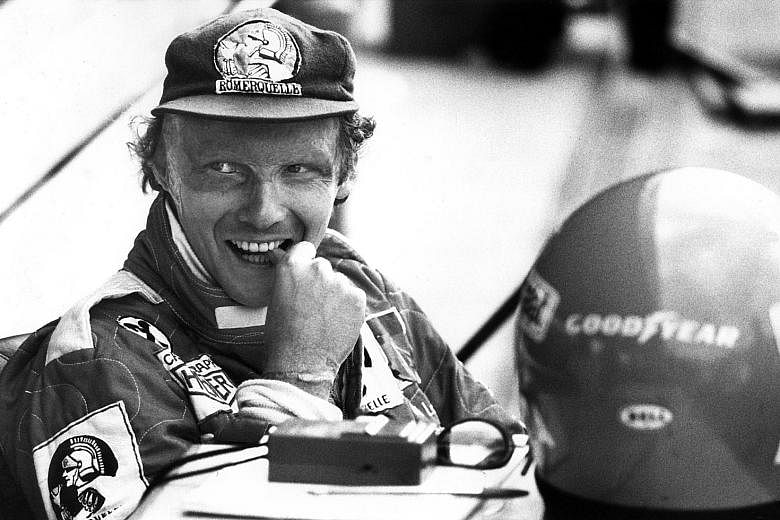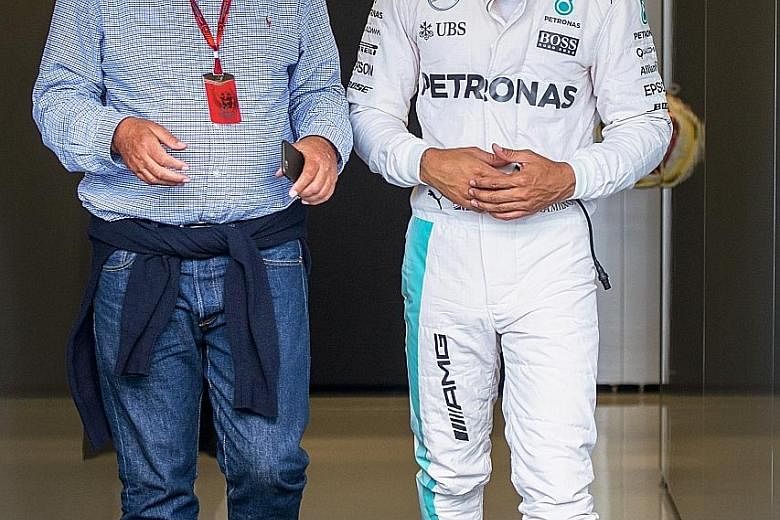VIENNA • Formula One legend Niki Lauda, who died late on Monday at the age of 70, will forever be known for his 1976 accident.
But even the horrific crash could not shake his icy determination. The 1975 world champion staged a near-miraculous comeback to win two more titles and went on to become a successful entrepreneur, founding his own airlines.
His family reported his death in a statement to the Austria Press Agency. It said that Lauda "passed peacefully in his sleep surrounded by his closest family at the university clinic in Zurich".
Besides a pair of twins with his second wife Birgit Wetzinger, he had three sons from previous relationships.
The Austrian had kidney transplants in 1997 and 2005 and, in August last year, while battling severe lung disease, underwent what was described as a successful lung transplant at a hospital in Vienna.
The scion of an industrial family that opposed his daredevil driving career, Lauda was a road warrior who dazzled crowds that lined the twisting, turning circuits of Europe, Africa, Asia and the Americas.
"Formula One is simply about controlling these cars and testing your limits," he told The Telegraph of London in 2015. "This is why people race - to feel the speed, the car and the control. If in my time you pushed too far, you would have killed yourself. You had to balance on that thin line to stay alive."
-
The tributes
-
"As a teammate over the past 61/2 years, Niki was always brutally honest - and utterly loyal. Niki, you are quite simply irreplaceable, there will never be another like you."
TOTO WOLFF, Mercedes team principal, on the team's non-executive chairman.
"Dear Niki, thank you for everything that you did for me. I learnt so much from you. Your passion, your fighting spirit, to never give up..."
NICO ROSBERG, Mercedes' 2016 world champion.
"Niki Lauda was a hero of motor sport, who inspired me in my youth. He is a milestone in the history of @F1 ."
JEAN TODT, International Automobile Federation (FIA) president.
"A highly accomplished athlete and entrepreneur... Niki is proof that passion is the fuel for success, and his dedication, courage and resilience will live on."
COLIN SYN, Singapore GP deputy chairman, on Niki Lauda, who founded his own airline.
"The big Ferrari family learns with deep sadness the news of the death of their friend Niki Lauda. You will remain forever in our hearts and in those of the fans."
FERRARI, on their 1975 and 1977 world champion.
As a schoolboy, he drove an uncle's BMW around a paper mill yard, and, at 14, he was taking Volkswagens apart. At 18, he quit school, borrowed money to buy a Mini Cooper and got into mountain racing. A year later, he went deeper into debt to acquire a Porsche 911.
In 1969, he began racing in earnest and won eight races at a low level of competition.
Over the next few years, he borrowed on his life insurance and, without authorisation, used his family name to finance better cars for tougher racing events.
His success drew the attention of Enzo Ferrari, the ageing head of the Italian motor car company who in 1973 invited him to join the Ferrari racing team.
In his 17-year career (1969-1985) in the open cockpit of Porsches, Ferraris and McLarens mostly in F1 competition, Lauda won 25 grand prix races and the world championships in 1975, 1977 and 1984.
After winning his first title, he seemed destined to repeat the feat in 1976. He was leading the standings when on Aug 1, his car plunged off the track for never-explained reasons and burst into flames on the notorious 22.8km Nurburgring circuit in Germany.
He was trapped in the burning vehicle for almost a minute before being pulled out by other drivers who stopped to rescue him.
Just days earlier, Lauda had said in an interview: "On the Nurburgring, if your car has a problem, you're 100 per cent dead."
But, six weeks after receiving last rites in his hospital bed, he surprised the world by taking part in the Italian Grand Prix in Monza.
"I kept telling myself... I'm not quitting," he told Newsday after he began a remarkable recovery.
Still in bandages after having suffered first-to third-degree burns over his face and hands and, having inhaled toxic fumes that damaged his lungs, he finished fourth.
Lauda missed only two races that season and still had a three-point lead over Britain's James Hunt at the season-ending Japanese GP.
He retired from the race after two laps in torrential rain, saying it was unsafe to continue and Hunt went on to finish third and claim his only world title by a point.
The rivalry between the two men and Lauda's extraordinary courage and fighting spirit were portrayed in the 2013 film Rush by American director Ron Howard.
Lauda won his second championship with Ferrari in 1977, before quitting F1 at the end of 1979 to pursue his second passion, civil aviation. But he came back to the race circuit in 1982, this time with McLaren, with whom he won his last world title in 1984.
Off the race track, Lauda - recognised by his trademark red cap hiding scars from his 1976 accident - founded and then sold several airlines with a majority stake of his latest going to Ryanair last year.
Cocky and confident, Lauda was never one to take no for an answer and ruffled more than a few feathers in F1 and, later in business, with his uncompromising behaviour.
But his expertise, sometimes brutal honesty and drive also won him respect from those who recognised his work ethic, analytical mind and willingness to learn from mistakes.
"Your passing leaves an enormous void inside me," said former Ferrari boss Luca di Montezemolo.
"With you, I have lived some of the most beautiful moments of my life, we shared many unforgettable Ferrari victories and we were always bound together by great affection, even when we found each other competing on rival teams."
NYTIMES, REUTERS, AGENCE FRANCE-PRESSE, DPA


